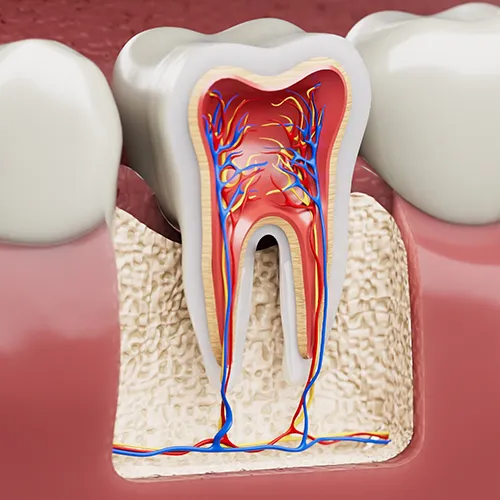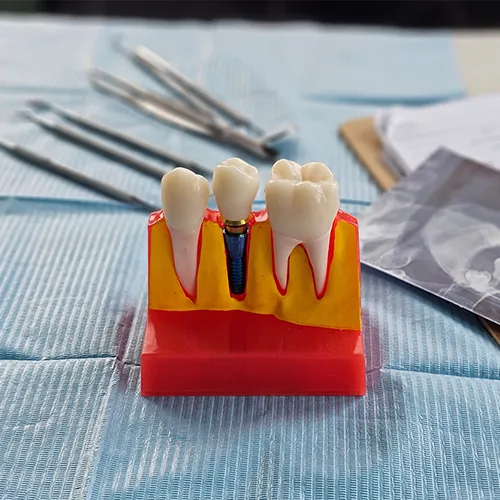Emergency Dentistry
When to See a Periodontist Instead of Your Regular Dentist
Most of us are used to seeing a general dentist for regular checkups, cleanings, and the occasional cavity. But if you’ve ever been told you might need to see a periodontist, you may have wondered: what’s the difference? Do you really need to see a specialist, or can your regular dentist handle it?
This blog walks you through the differences between a periodontist and a general dentist, when each is appropriate, and why knowing the distinction could be a game-changer for your long-term oral health.
What does a periodontist do that a general dentist doesn’t?
Let’s start with the basics. A general dentist is your go-to for overall dental care: cleanings, exams, fillings, crowns, and preventive treatment. They’re trained to identify a wide range of oral health issues and treat many of them directly.
A periodontist, on the other hand, is a specialist. After dental school, periodontists undergo several additional years of training focused specifically on the supporting structures of your teeth—namely, your gums and the bone beneath them. They specialize in diagnosing and treating periodontal disease (gum disease), placing dental implants, and performing complex procedures like gum grafting or bone regeneration.
If you think of your mouth like a house, your general dentist is the person who handles day-to-day upkeep: fixing chipped paint or squeaky hinges. The periodontist is the contractor you call when the foundation is showing cracks.
Some of the treatments and procedures a periodontist provides include:
- Deep cleanings for advanced gum disease (scaling and root planing)
- Gum grafts to cover exposed roots
- Bone grafting to rebuild bone lost to disease
- Dental implant placement and repair
- Cosmetic gum contouring
- Laser periodontal therapy
While general dentists can manage early gum issues, more advanced or stubborn conditions often require a specialist’s care to prevent long-term damage or tooth loss.
When should I see a periodontist instead of my dentist?
This is one of the most common questions patients ask when they’re referred—or when they start noticing gum issues on their own. Sometimes, the signs are subtle, but they can point to deeper problems below the surface.
Here are a few situations where seeing a periodontist might be the best move:
- Your gums bleed easily during brushing or flossing. This isn’t just a sign you’re brushing too hard—it could indicate inflammation and early-stage gum disease.
- You’ve noticed your teeth look longer than they used to. This may be caused by gum recession, which a periodontist can help treat or even reverse.
- You have persistent bad breath that doesn’t go away with brushing or mouthwash. Chronic bad breath is often tied to bacteria buildup beneath the gums.
- Your teeth feel loose or shift easily. This can mean the bone supporting your teeth is being compromised, something that needs immediate attention.
- You’re planning to get a dental implant. While some general dentists do place implants, periodontists are trained specifically in implant placement and tissue management for better long-term results.
Even if your symptoms seem manageable, it’s always better to catch gum issues early. Periodontists have the tools and training to intervene before things get worse—and that can make all the difference in preserving your smile.
Do I need a referral to see a periodontist?
Not necessarily. Many patients come to a periodontist after their general dentist makes a referral, but it’s also perfectly fine to reach out directly—especially if you’re noticing signs of gum disease or have had past issues with your gums.
At Akemi Dental Specialists, we often see patients who want a second opinion about their treatment plan or are experiencing discomfort that hasn’t improved with general dental care. Your oral health is personal, and we believe in empowering patients to be proactive.
Keep in mind that working together with your general dentist and periodontist isn’t an either/or situation. In fact, they often collaborate, sharing records, treatment notes, and long-term plans to ensure you get the best care. Think of your general dentist as the quarterback and the periodontist as a specialist brought in to run a particular play. The goal is the same: keeping your teeth and gums healthy for life.
So how do I know which one I need right now?
If your main concerns are things like cleanings, cavities, mild sensitivity, or preventive care, your general dentist is the best place to start. But if you’re dealing with any of the following, it’s time to consider booking with a periodontist:
- You’ve been told you have gum disease or deep pockets
- Your gums are receding or inflamed
- You’ve lost a tooth and are thinking about an implant
- Your dentist mentioned bone loss or referred you to a specialist
- Your previous gum treatment hasn’t worked or symptoms returned
Even if you’re not sure, it doesn’t hurt to schedule a consultation. A periodontist can assess your situation, walk you through treatment options, and coordinate with your dentist if needed. The goal isn’t to over-treat—it’s to make sure you’re getting the right level of care for your needs.
Let’s take care of your smile, starting with your gums
Your teeth may get all the attention, but your gums are the foundation. They hold everything in place, protect your roots, and play a major role in your overall health. Gum disease has even been linked to heart issues, diabetes, and pregnancy complications, so it’s not something to take lightly.
Whether you’ve been referred to a periodontist or simply feel like something’s not quite right, we’re here to help. At Akemi Dental Specialists, our team is experienced, compassionate, and committed to giving you the best outcome possible. We’ll take the time to listen, evaluate your needs, and create a personalized plan that puts your comfort and health first.
If your gums need a little extra love, we’re just a call away. Book your appointment with Akemi Dental Specialists today and let’s take the next step together.























